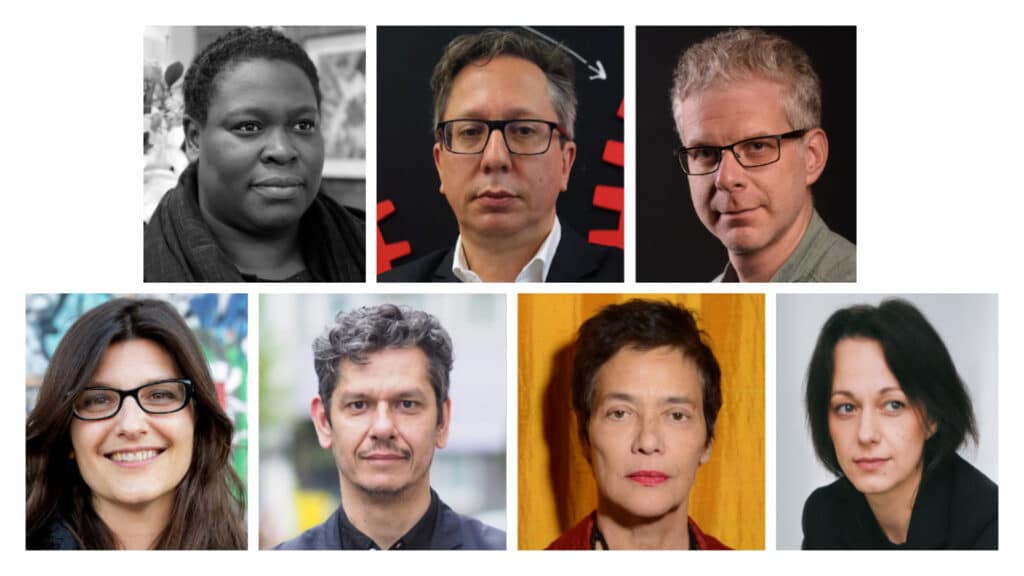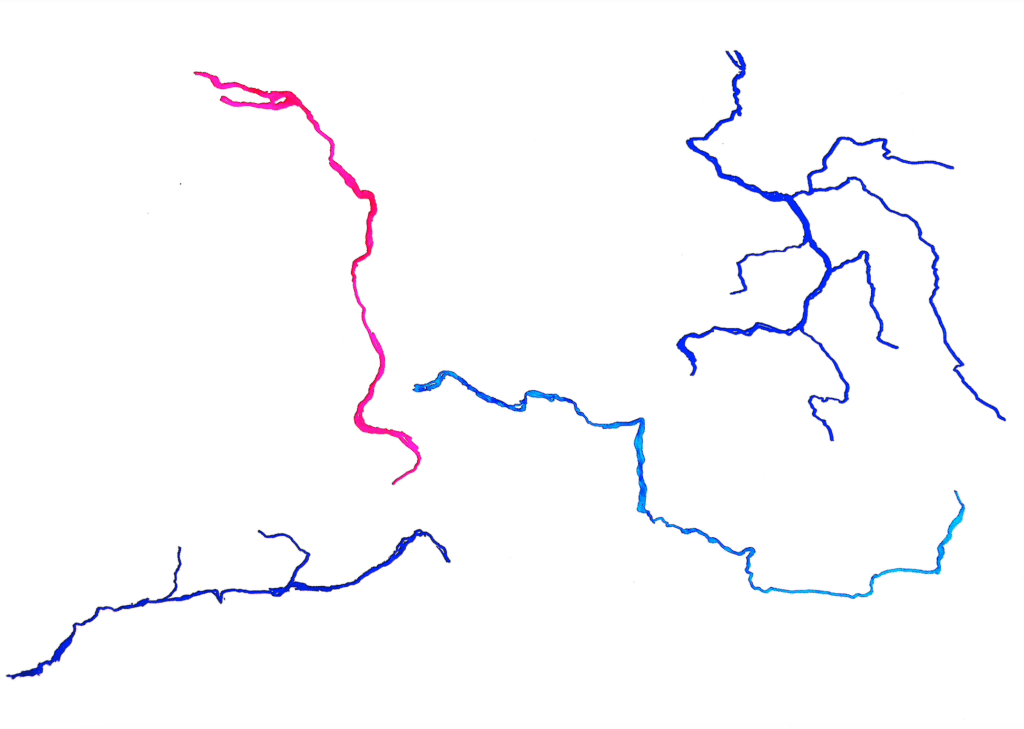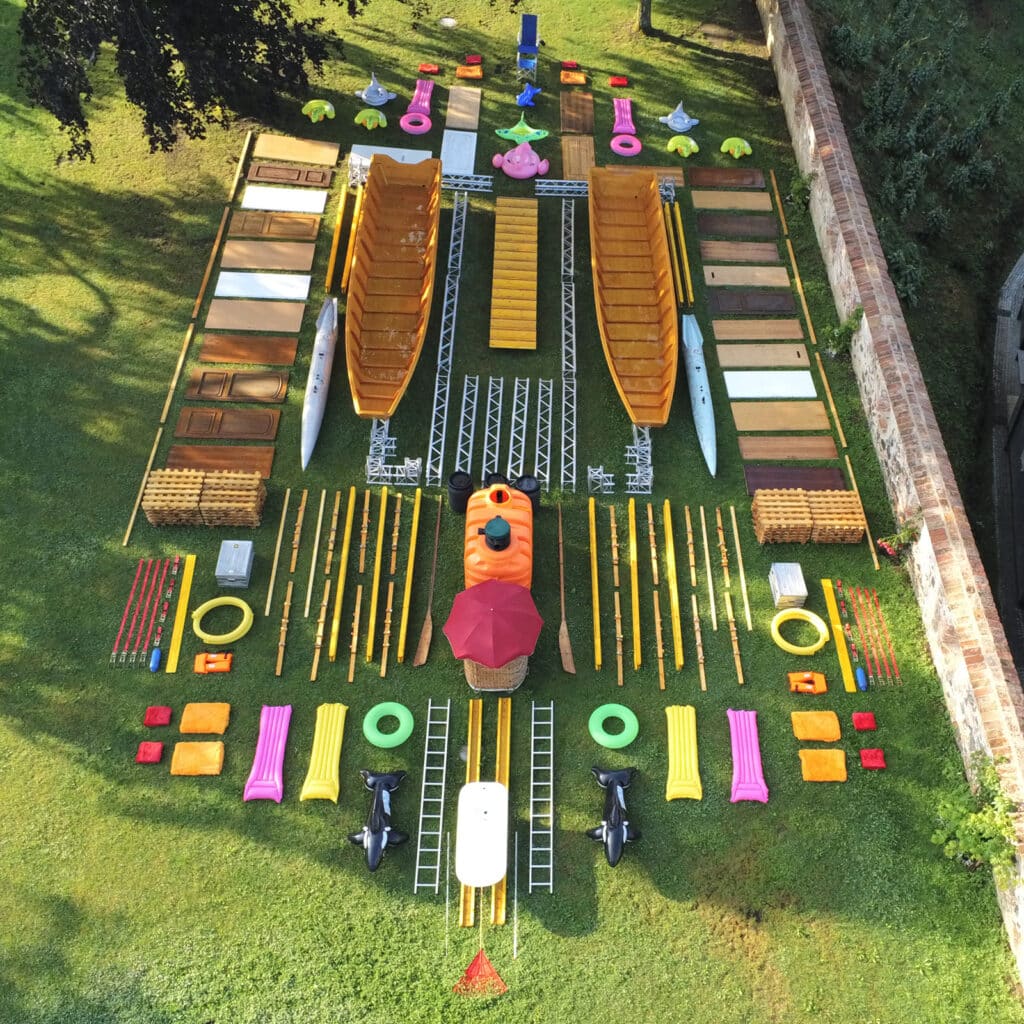Het winnende voorstel van de open call van de European Cultural Foundation voor het vormgeven en hosten van The European Pavilion 2024 werd bekendgemaakt tijdens een persconferentie in Het Nieuwe Instituut in Rotterdam op 14 februari.
Een onafhankelijke jury koos unaniem voor het voorstel Liquid Becomings van het consortium onder leiding van het onafhankelijke kunstenaarscollectief espaço agora now, bestaande uit de organisaties FLOW, MS-Fusion, Teatro Meia Volta en United Artist Labour. Liquid Becomings neemt de vorm aan van een reizend paviljoen van vier boten die achtentwintig dagen lang op vier Europese rivieren varen, voordat ze in november 2024 samenkomen in Lissabon voor een laatste artistiek programma.
Naomi Russell, oprichter van espaço agora nu: “We zijn ontzettend trots dat de jury voor ons initiatief heeft gekozen. Ons formaat is om verschillende redenen atypisch: er zal niet alleen geen fysiek paviljoen zijn, maar Liquid Becomings is een geheel door kunstenaars ontwikkeld en geleid initiatief is. Via Liquid Becomings zullen we vele kleine agora’s creëren op vier Europese rivieren, waar kunstenaars en gemeenschappen samenkomen om hun ervaringen te delen en samen nieuwe verhalen te creëren, waarbij we de complexe polycrises van ongelijkheid en wantrouwen, natuur-degradatie en klimaatverandering aanpakken. Door te luisteren naar de verhalen van gewone Europeanen vaak buiten de gebruikelijke centra, willen we bijdragen aan het herdefiniëren van de toekomst van Europa.”
Over Liquid Becomings
Liquid Becomings is geen traditioneel paviljoen. Het is geen tentoonstelling. Het vindt niet eens op één locatie plaats. Liquid Becomings is een reis, een avontuur, een radicaal experiment.
Vier boten vertrekken op 1 september gedurende 28 dagen en varen tegelijkertijd over vier Europese rivieren: de Donau, de Wisla, de Rijn en de Taag, waarbij ze in totaal dertien landen doorkruisen. Hun bemanningen, bestaande uit een team van kunstenaars en een kapitein zullen zich elk op verschillende thema’s concentreren: Ruïnes en monsters, Perimeters, Saamhorigheid en Lichamen en politiek. Elke boot zal ruimte maken voor gemeenschappen en mensen die ze onderweg ontmoeten om samen te komen en creativiteit te delen, om verhalen te creëren die het Europa van morgen zullen vertellen – verhalen geïnspireerd door deze vier grote waterwegen.
De bemanningen zullen alternatieve manieren ontwikkelen om samen te zijn. De kunstenaars zullen ideeën over andere manieren van leven en speculatieve toekomsten onderzoeken. De boten zijn eenvoudige schepen die een eenvoudige, duurzame en langzame manier van reizen mogelijk maken. We verwachten het landschap, de elementen en de mensen die langs de rivieren leven vanuit een uniek, verbonden perspectief te ervaren. Dit is een reis die participatief en bijdragend is.
In november bundelen de bemanningen van alle boten hun krachten in Lissabon. Een driedaags artistiek programma waarin polyfonie, overgangs-ruimtes en het rondreizen worden gevierd, zal de oude haven van Beato verbinden met Quinta Alegre, een sociaal-cultureel complex aan de noordelijke rand van Lissabon. De ontmoetingen en gesprekken, maaltijden, rituelen, verhalen, die tijdens de reizen zijn verzameld zullen worden vertaald in een nieuwe mythologie voor Europa, verteld door kunstenaars en burgers.
Van open call tot Liquid Becomings: juryoverwegingen
Naar aanleiding van de open call for curatorial proposals om The European Pavilion 2024 vorm te geven en te hosten ontvingen de European Cultural Foundation 39 gedurfde voorstellen. De meeste hiervan betroffen internationale samenwerkingen en artistieke producties, en twintig ervan werden geleid door consortia die samen meer dan dertig landen vertegenwoordigden uit alle hoeken van Europa en daarbuiten, van Turkije tot Denemarken, van Oekraïne tot Portugal, en van Nederland tot Griekenland. Een onafhankelijke jury onder voorzitterschap van Sepake Angiama selecteerde uit de vijf finalisten één laureaat.

Volgens de jury heeft Liquid Becomings een gedurfd artistiek formaat voor ogen. Een belangrijke overweging was dat Liquid Becomings ook het orthodoxe model van nationale paviljoens, oorspronkelijk opgericht in koloniale tijden, en wat ze vertegenwoordigden, uitdaagt.
De jury was onder de indruk van de symboliek die het voorstel vertegenwoordigt: Liquid Becomings choreografeert een artistieke stroom over de moderne en steeds ondoordringbaarder wordende grenzen van Europa, door kleine boten te laten varen langs de eeuwenoude handels- en mensenroutes – de Wisla, de Rijn, de Donau, en de Taag.
In de aanloop naar de onthulling van Liquid Becomings als het winnende voorstel voor The European Pavilion 2024 vroegen we Naomi Russel van espaço agora now en Lore Gablier, Programmamanager bij ECF, om enkele vragen te beantwoorden.
We vroegen Naomi wat Europa in werkelijkheid is, en hoe onze verbeelding het vorm kan geven?
Naomi: “Ik stel de vraag terug! Wat is Europa in werkelijkheid? De uitdagingen waarmee de wereld wordt geconfronteerd, laten geen enkel continent of land onberoerd. Dit maakt het noodzakelijk dat Europa – wij – de constructies van zowel de geschiedenis als de verbeelding ter discussie moeten stellen. In Liquid Becomings willen we het Europese gevoel van verbondenheid opnieuw onderzoeken, in de context van migratie en mondiale veranderingen in sociale geografieën. We willen op zoek gaan naar nieuwe Europese mythologieën door middel van transnationale, multiculturele uitwisseling van kennis en praktijken.”

In welke opzichten is Liquid Becomings symbolisch voor het Europese project?
Naomi: “Liquid Becomings zal de mythen en verhalen onderzoeken die de hedendaagse Europese identiteit opbouwen. Het drijvende paviljoen verkent waterlichamen als podia, waardoor een ongebruikelijke relatie ontstaat tussen de zeilende kunstenaars en het publiek. Liquid Becomings stelt voor om het proces te behandelen als een kunstwerk en het delen van tijd, aandacht, energie en middelen te zien als een performatieve en politieke actie. Wij zijn ervan overtuigd dat een toekomstbeeld van Europa een actieve betrokkenheid van de vele Europese samenlevingen en een polyfonie van stemmen en ervaringen mogelijk moet maken, waarbij vooral degenen moeten worden betrokken die buiten de gevestigde en institutionele structuren leven. Door op de rivieren te varen, waardoor wij de vreemde mensen op de rivieren zijn – de ander – hopen we hen te bereiken en bovendien te horen wat ze denken, voelen en verlangen voor de toekomst.”
Hoe kunnen artistieke verbeeldingskracht en creatieve ideeën bijdragen aan het opbouwen van eerlijkere en duurzamere samenlevingen?
Naomi: “espaco agora gelooft dat we de stemmen van onafhankelijke kunstenaars die midden in de samenleving staan hard nodig hebben, omdat hun verbeeldingskracht en vermogen om de toekomst te zien van fundamenteel belang zijn voor het oplossen van de grote uitdagingen van vandaag. De milieuwetenschapper Gus Speth, die het World Resources Institute oprichtte, formuleerde het een paar jaar geleden in een notendop toen hij zei: “I used to think that the top environmental problems were biodiversity loss, ecosystem collapse and climate change. I thought that with 30 years of good science we could address those problems. But I was wrong. The top environmental problems are selfishness, greed and apathy. To deal with those we need a spiritual and cultural transformation. And we scientists don’t know how to do that.” Dit is waar artistieke verbeeldingskracht en artistieke praktijken een unieke rol spelen, vooral waar burgers actieve deelnemers aan – en reacties kunnen geven op het creatieproces en de vorming van ideeën.”
Lore: “Misschien moeten we ons eerst afvragen wat onze samenlevingen onduurzaam en onrechtvaardig maakt. Is er geen status quo die we zouden moeten deconstrueren? En zijn het niet juist de kunsten die ons wakker schudden, die ons ertoe aanzetten ons een andere wereld voor te stellen? Dat gezegd hebbende, zal het bereiken van een duurzamere en eerlijkere samenleving voor iedereen meer dan verbeeldingskracht vergen. Twee van de selectiecriteria voor de laureaat van de subsidie voor The Europese Pavilion zijn duurzaamheid en diversiteit: kandidaten moesten in hun plannen concrete maatregelen voorstellen – of het nu ging om bestuur, vertegenwoordiging, salarissen, productie, etc. – waaruit bleek dat ze respectvol met mensen en de planeet om zouden gaan. Met The European Pavilion is het dus ook onze ambitie om een voorbeeldig artistiek evenement mogelijk te maken, waarbij duurzaamheid en gelijkheid niet alleen een artistieke en intellectuele zorg zijn, maar ook de concrete implementatie ervan bepalen.”

In welke opzichten verschilt Het Europese Paviljoen van soortgelijke evenementen elders in de wereld?
Lore: “Misschien wel het meest onderscheidende kenmerk van The European Pavilion is de expliciete focus op Europa. Er zijn veel festivals en andere artistieke evenementen met een Europese dimensie (bijvoorbeeld vanwege hun partnerschappen of hun rondreizende karakter), maar geen daarvan plaatst Europa in het middelpunt van hun programmering. Bovendien is het The European Pavilion, ondanks zijn naam, geen gebouwde of vaste ruimte, maar een ruimte voor experiment en verkenning. De gedachte is juist om het idee van het paviljoen in twijfel te trekken, waarvan de genealogie wortelt in de Europese koloniale geschiedenis en de constructie van nationale denkbeelden. Met The European Pavilion nodigen we culturele organisaties en kunstenaars uit alle disciplines uit om na te denken over Europa en zich voor te stellen wat het zou kunnen of moeten worden. Het zijn hun creatieve processen en artistieke producties die vormgeven aan The European Pavilion: dit jaar zal het de vorm aannemen van vier boten. Maar het zou net zo goed een podium kunnen worden, een film, een virtuele omgeving, een school, en in de toekomst ongetwijfeld ook een vorm die we ons nu nog niet kunnen voorstellen.”
Het succesvol opzetten The European Pavilion vergt een enorme gezamenlijke inspanning met allerlei verschillende verantwoordelijkheden. Hoe kunnen we, via de metafoor van het paviljoen, van Europa een succes maken?
Naomi: “Ik ga hier Tania Brugera en haar recente performance in Hamburg parafraseren. We moeten praten. Dat moet. En we moeten onze vooroordelen opzij-zetten en de tijd nemen om te luisteren als we een dialoog aangaan. Pluralisme is van nature conflictueus. Er zal altijd een veelheid aan perspectieven zijn. Chantal Mouffe, die ons met haar concept van horizontaal agonisme inspireerde, spreekt over de onmogelijkheid om alle standpunten met elkaar te verzoenen. Ze vervolgt met te zeggen, en ik hou van haar definitie: als we een ‘wij’ vormen, moeten we het onderscheiden van een ‘zij’.”
‘Een toekomst verteld door de rivier, een toekomst verteld door ons allemaal.’
espaço agora now verwacht dat in totaal 46 onafhankelijke kunstenaars betrokken zullen zijn bij Liquid Becomings. Ze doen een dezer dagen een gerichte uitnodiging aan kunstenaars uit om een residentie op de boten in te dienen, omdat ze met een zo divers mogelijke groep kunstenaars willen werken, inclusief kunstenaars die buiten Europa gevestigd zijn, ook in het Zuiden.
Naomi: “We wilden een voorstel maken dat over grenzen heen reikt en zich buiten de gebruikelijke centra toont. Te veel mensen in onze samenleving voelen zich vervreemd en in de steek gelaten. Het simpele idee om deze mensen te ontmoeten op de plekken waar zij wonen, leek urgent. En vanwege de Europese dimensie vonden wij het noodzakelijk om zoveel mogelijk gebieden te bereiken. Dit betekende dus ook dat we het concept van het op één vaste plek zijn moesten heroverwegen. Ons concept vormde zich rond de vraag hoe de enige manier om ruimte te maken voor een toekomstbeeld van Europa was door de liminale fase te vieren, ons onder te dompelen in het niet-weten en een omgeving te creëren waarin nieuwe ordes kunnen ontstaan. Elke rivier volgt dus verschillende routes en verbindt verschillende regio’s.”
Naast het uitnodigen van lokale experts op de boten op de verschillende routes, zal Liquid Becomings betaald werk aanbieden aan mensen langs de route die hun ervaringen komen vertellen. Bij de voorbereiding van elke route werken zij samen met minimaal vijf maatschappelijke partners per rivier. En zodra de boten varen kan het publiek de boten komen bezoeken. De verschillende fasen en trajecten van Liquid Becomings zijn straks te volgen via The European Pavilion.
